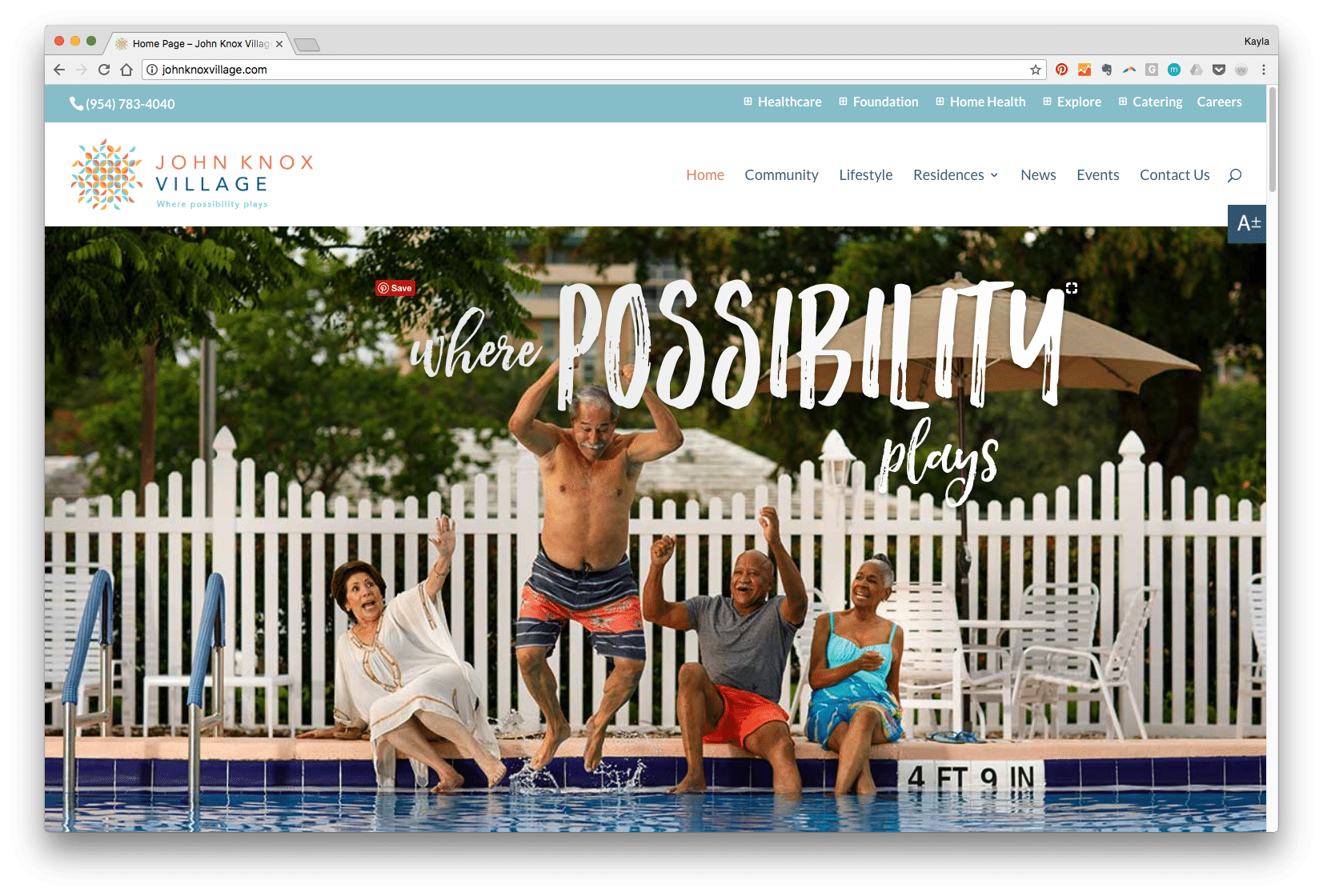“The times they are a-changin’,” penned 76-year-old Bob Dylan in the l960s. Interestingly, that’s a very pertinent observation about senior living’s up-and-coming independent living target audience—it’s a-changin’ in oh so many ways.
If you’re hoping to entice a younger resident base into your 62+ Life Plan Community—which is ideal, of course—then understanding how those now entering your target market’s age-range perceive themselves is essential. Knowing the way these people picture living out “life’s third act”—as recent People magazine cover person 80-year-old Jane Fonda calls it in her Ted Talk about the “longevity revolution”—is imperative.
According to the many astute observations Love & Company’s Executive Vice President Tom Mann made in a recent Leader’s Board post, Six Senior Living Trends 2018 and Beyond, trends point to independent living prospects of the future who may not respond positively to—or identify with—words like “retirement” or “senior.”
That’s a big “heads up” for those of us whose mission it is to help senior living organizations’ Life Plan Communities prepare to thrive now and well into the next decade.
“Oh…and for our website, collateral, new brand (fill in the blank), don’t use the word ‘senior’ anywhere!”
Tellingly, that’s been the directive from a number of our clients of late when it came to addressing prospective residents for their Life Plan Communities—from blue-sky to rebrands and expansions. Of course, Love & Company, with our bent for leading edge market intelligence, has been keenly following the growing generational differences regarding the perception of the word “senior” for quite some time. Although it remains an apropos and venerable term of respect in many instances, the actual age-range one pictures as “senior” may be starting to skew significantly older than in the past.
As Love & Company’s President Rob Love noted in a recent tech trends report, “…active adult community builders are eyeing the growing population of aging boomers and designing their homes to integrate technology so that homeowners can age in place. This will transform 55+ communities from sources of residents to more direct competition.” As a Life Plan Community, if your competition for future independent residents is segueing out of calling people “seniors,” it’s worth considering going forward.
Determining appealing nomenclature for Baby Boomers and their older peers isn’t new as a hot marketing topic. A 2013 CNN article titled “Survey Shows What Boomers and Seniors Like To Be Called” reported on a survey of 1,114 participants by SeniorMarketing.com. Some of the notable observations included, “…the terms we use to describe boomers, seniors, and senior living might be offensive…50.8% of participants responded saying they are not comfortable with the term ‘senior’ but, 71% of respondents are comfortable with the term ‘Baby Boomer.’ In today’s environment, boomers are caring for aging parents and usually don’t view themselves as seniors… If you’re sending out marketing pieces to Boomers and you’re using the term ‘senior,’ you’re immediately alienating half your prospects.” Welcome to 2018! The oldest Baby Boomers are 72. Turns out our “senior” eschewing clients are right on track. . . especially for blue-sky start-ups or expansions looking to move in their first residents 3 to 5 years from now.
Certainly, all of this falls in line with the research that indicated that Continuing Care Retirement Community wasn’t exactly kosher with this crowd either. In 2015, Love & Company participated in the “name storm” project spearheaded by LeadingAge. After rounds of options, focus groups and industry-wide soul searching, Life Plan Community was adopted as the most accurate and future-resident-enticing term to replace Continuing Care Retirement Community (CCRC)—a term that resonated with 62+ people as “like your grandma’s nursing home” and “certainly not for me.”
And now, we find that easing up on the word “senior” is right on trend. The Life Plan Community independent living customer of yesteryear is simply not the person with whom you need to be conversing today.
“Senior?” You talkin’ ‘bout my generation?
We humans are an aspirational bunch. So even though your community’s target audience may not be the cutting edge of cool, it may be wise to remember that some of their 70+ peers still are. The media on every platform is overflowing with high-profile, still-trending leaders in virtually every aspect of business, fashion, music, art, politics, design, cinema, activism and more who are healthily upwards of age 70. All ages revere 87-year-old Warren Buffet’s latest pearls of investment and living well wisdom. Newest CoverGirl® model Mae Musk says, “At nearly 70 years old, my favorite hash tag is: #justgettingstarted!” The list goes on and on. And let’s not forget, ageism is a huge no-no and becoming more so every day—and not just in the workplace. But that’s a topic for another time.
Fun with mindset math
Recently, a number of Love & Company colleagues and myself were looking to position an altogether new independent living concept to a sophisticated, urban audience, with 72- to 80-year-olds being the prime target. At one point, we started doing the math and looking at the music “soundtrack” that was playing while these people were embracing adulthood. We settled on a mid-range of current 76-year-olds born in 1942. Here are a few memorable musical moments from 1967 when they were 25:
“I can see for miles and miles and miles”…The Who
“The beat goes on”…Sonny and Cher
“All you need is love”… The Beatles
Yep, today’s “seniors” were the first to listen to Elvis, the Beatles, the Stones, Motown, psychedelic anthems and the evergreen vibes of classic rock. Think about what else was going on in the world…and how much would change and evolve—spearheaded and experienced by today’s 70- to 80-somethings. It’s a fun exercise. (You are correct. This was a “don’t use the word senior” project.) It’s also insightful. As columnist Bev Beckham puts it in “Don’t Call Me a ‘Senior’” on Grandparents.com, “We may be 65 or 70 or 80, but here’s the real truth, and something I wish everyone…would keep in mind at all times, we are exactly who we have always been.”
Want to see a successful 50-year-old Life Plan Community drop “senior” from its fresh new rebrand?

As Marketing Director Monica McAfee of John Knox Village in Pompano Beach, FL, told us when we teamed up with her talented department to write, design and do all the digital magic that enables a super responsive website to go live, “We don’t want you to use the word senior anywhere. People who come to our site know who they are. Reference Coastal Living magazine for the kind of upbeat fashionable writing that appeals to our residents— that’s the kind of lifestyle we offer.” What a pleasure collaborating with Monica, her extraordinary team and Mythic advertising to bring John Knox Village’s new brand line “Where Possibility Plays” to life in storytelling copy with not a “senior” or “older adult” in sight.
You can see the awesome results at www.johnknoxvillage.com!
So is “senior” out?
Just for fun, Google “Don’t call me senior.” From posts on Grandparents.com to LinkedIn, to Atlanta Jewish Times to the HuffPost and beyond, it’s an entertaining and enlightening read. Spoiler alert: “senior” doesn’t fare well.
If you’re a Baby Boomer like myself—and many of you reading this are—maybe we’re happier flaunting the perennially avant-garde Boomer badge. But frankly, we’ve never been comfortable with labels and stereotypes. And neither have our older peers from the tail end of the Silent Generation.
Much as Life Plan Community resonates more with today’s and tomorrow’s prospective residents than CCRC—perhaps moving beyond “senior” is simply the next step in the evolution toward making Life Plan Communities synonymous with easy, breezy great living and savvy planning for those who will always want to live life to the fullest.
Helping Life Plan Communities connect, converse with and convert 70+ consumers into happy residents is at the basis of all that Love & Company does. Want to know more? Call Tim Bracken at Love & Company. He knows everything.




